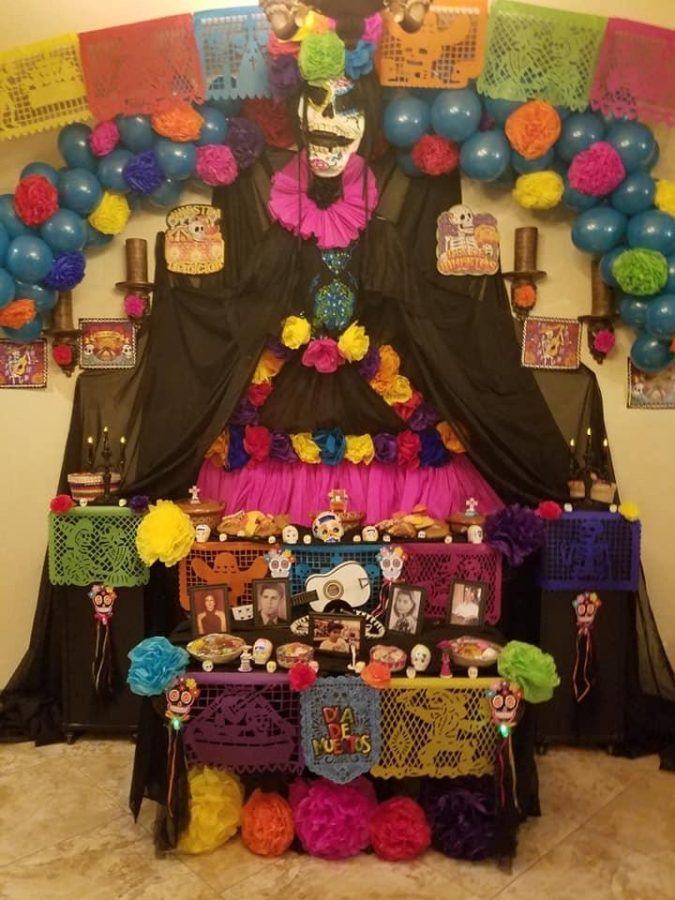Is it Taboo to You?
This is the ofrenda that is decorated on Día de los Muertos.
As the technology continues to progress and continually become more advanced, culture is able to be easily spread. Some aspects of cultures may be seen as taboo to the people who are uninformed about it, while the people who practice the culture see it as fitting for their belief system.
Día de los Muertos, also called Day of the Dead in English, is a Mexican holiday that celebrates remembering and honoring the passing of loved ones. The holiday is thought of as wholesome and joyous, however, Spanish teacher Ivonne Want says that people may view the celebration as negative or taboo if they don’t quite understand the concept of it.
“I celebrate Día de los Muertos, or Day of the Dead. I think the reason that it seems taboo, in my opinion, is the skulls. You see skulls and people start thinking there must be something satanic or something bad, but it really isn’t. As kids growing up in Mexico, that was the best part, the sugar skulls, because we got to eat all the sugar we wanted,” said Want. “It’s not knowing what it is, what it means, or what is celebrated on these two days is mostly what makes it taboo to others, I would imagine.”
Día de los Muertos began being celebrated in the times of the Aztec Empire. According to Want, death was simply thought of as traveling to a new place, all while not being forgotten.
“They didn’t quite see death the way we [people in the U.S.] see it, whether they were Christian or not. They saw it as you just move on to another place. It’s like what we would think of as moving from one city to another. They set aside two days of the year. One for adults and one for children so that they could comeback and visit you on this day if you remembered them,” said Want.
For many holidays, cooking and decorating play an important part in the celebration, making it more festive and jubilee. For Day of the Dead, Want explains, “ofrendas” have a significant role which compliments the principle of the holiday, making it a custom for these two days.
“A part of the ofrendas, or the alters as we would call them here, are candles. The main reason for the candles is to light the way for them, so they can always find their way back home,” said Want. “It’s just remembering our dead and it’s seen as moving on. It wasn’t anything scary or the end-all-be-all of life. It’s just a different belief. To educate others, I explain what it is and the roots of it. Then I share some stories of my childhood, growing up in Mexico.”
As an Iranian-American, senior Ashley Farokhrouz grew up celebrating a festival celebration that Iranians believe symbolize new beginnings and happiness for the upcoming year. While celebrating, Iranians have a tradition which may seem odd to some.
“We have this festival called Chaharshanbe Suri celebrated on the last Wednesday of the year. People jump over fire to represent the new birth of their should for the new year. It’s supposed to be a symbol of good health and purity to the soul. People might just think it’s taboo jumping over fire, but it’s a really symbolic celebration,” Farokhrouz explained.
Farokhrouz believes that it is okay for people to think some part of a culture is peculiar because they can always be educated about it in the end, which will allow them to better understand parts of the culture.
“If somebody thinks it’s weird, that’s okay. It’s not a bad thing. They should just be more informed about it, and I would educate them about it. If they want to accept it, they can. It’s just up to them at that point. If I know that I’ve educated them and told them about it, then I know I did my part,” said Farokhrouz.
The culture of Ireland includes a number of things such as music, literature, and art. Sophomore Brynlee Hill is a competitive Irish dancer and she says that her grandmother practices Wicca, religion that is pantheistic and has deities within it. In practicing it, she performs “smudging.”
“My grandmother is Wiccan and for New Years, we have a Yule party to support her religion. It’s around the winter solstice. For the religion, she does ‘smudging,’ where you get sage and light in the fire. You just wave it around it gets rid of bad [energy],” said Hill.
Hill says that she can see how people would view it as odd since it is also correlated with magic. However, even though she doesn’t practice it herself, she still finds it interesting how Wicca can act as a safeguard for its believers when they feel there may be a negative aura around.
“It may be considered taboo because a lot of people automatically associate Wiccan with witches. It’s not that my grandmother believes in witches, she’s just more open to things. If you were to go up to her and said you felt like there was a bad spirit over you, she say, ‘Oh, let me smudge you.’ It’s kind of like a protection thing. I think it’s really interesting to see how she looks at things,” said Hill.
Culture is used to bring a group of people together and can define someone’s identity. With every culture being different, each one makes them unique to different parts of the world.



